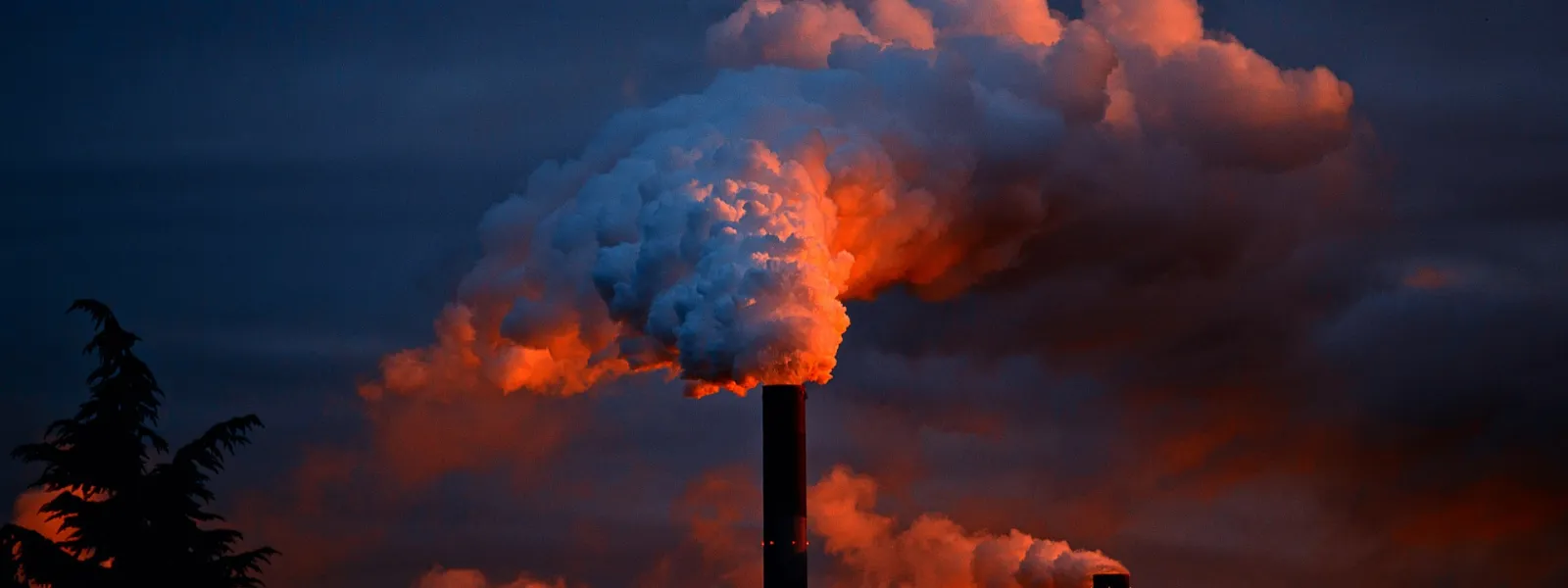
Project
Combating Short-Lived Climate Pollutants (SLCPs)
You encounter them every day: soot from auto exhaust and burning wood (black carbon), gases that make refrigerators and air conditioners cool (hydrofluorocarbons), natural gas that makes your stove work (methane), and ground-level ozone formed by sunlight and fossil-fuel emissions. Short-live climate pollutants are all around us. And controlling them holds great potential in the fight against climate change.
Short-lived climate pollutants (SLCPs) are so named because they last a relatively short time in the atmosphere, from a few days to a few decades. In contrast, carbon dioxide (CO2) can last centuries. Yet they’re a major contributor to climate change, degrade air quality, and have grave impacts on food security and the health of the world’s most vulnerable populations.
According to the Intergovernmental Panel on Climate Change, SLCPs are responsible for more than 30 percent of global warming (more recent studies estimate their contribute to be as high as 45 percent).
Effective control of SLCPs could create significant progress in the near-term fight against climate change, buying time to implement long-term solutions. It could also mean better air quality, a reduction in premature deaths from respiratory and heart disease, and improved crop yields.
Related projects
Latest News

An alliance for clean air in Latin America is born
In the face of environmental injustices, like poor air quality and its harm to human health, our societies respond together and organize in similar ways, without even knowing it. This was one of the takeaways from the Latin American Meeting for Clean Air, which in early August brought together researchers, government officials, youth leaders, civil society representatives and international cooperation agencies from Brazil, Chile, Colombia, Ecuador, Mexico and Peru. They met with three main objectives: to strengthen the link between air quality and climate justice, to exchange lessons learned, and to build networks for international collaboration. "Poor air quality and related health problems are a common problem in Latin America, knowing no borders or territorial boundaries," explained Anaid Velasco, Research Manager at the Mexican Center for Environmental Law (CEMDA). According to the World Health Organization, air pollution affects close to 90 percent of people living in urban areas around the world. Despite the magnitude of the problem, public actions and policies to improve the air we breathe are not fully standardized. In addition, air quality indices across the region are not uniform and do not allow people to be adequately informed of the dangers of air pollution in different environments. This represents a problem and, at the same time, an opportunity to collaboratively create and refine tools. Aware of the opportunity, meeting participants founded the Latin American Coalition for Clean Air (ALAIRE) to respond to three primary goals: To position a narrative that makes air quality a strategic priority in the public health and climate crisis management agendas in Latin America. To influence authorities and promote public policies that contribute to an improved management of the sources that contribute to poor air quality in the region. To advocate for conditions for civil society and the business sector to become involved in compliance with regulations, policies and the improvement of air quality in the continent. "The creation of this coalition is a fundamental step towards improving the air we breathe, across the region," Velasco said. "CEMDA is very proud to be part of it as clean air is a fundamental condition to guaranteeing the human right to a healthy environment." The Latin American Meeting for Clean Air was organized by AIDA, El Derecho a No Obedecer (a project of Corporación Otraparte), Trébola Organización Ecológica, Coalición Respirar, El Poder del Consumidor and the Heinrich Böll Foundation. It had open activities attended by 200 people, as well as closed meetings to reach agreements among the key organizations. The meeting served to reaffirm that the fight for clean air is also the fight to reduce greenhouse gases and confront the climate crisis, as well as a necessity to guarantee the right to health of people in the region. The event also confirmed the importance of citizen science, in which individuals are working to demonstrate the true levels of exposure to poor air quality in different cities in the region, in turn highlighting the urgency to act. The newly formed coalition will empower the efforts of citizens, academics, organizations and other actors, while contributing to the achievement of regional agreements for the development and implementation of public policies that improve air quality and protect human health.
Read more
Science's call to action for climate and air
By Fabio López Alfaro y Luisa Gaona Quiroga, AIDA interns The first installment of the Intergovernmental Panel on Climate Change’s (IPCC) Sixth Assessment Report—which will be completed in 2022—devotes an unprecedented entire chapter to short-lived climate pollutants (SLCPs), the reduction of which can mitigate the climate crisis and improve air quality. The IPCC's emphasis on these pollutants reaffirms the intrinsic relationship between climate and air, as well as the urgent need to implement effective and joint measures for their protection. SLCPs are compounds that absorb or reflect solar energy. They have the capacity to heat or cool the Earth on short time scales (days to years), in contrast to greenhouse gases, such as carbon dioxide, whose climate impact can last decades, centuries or even longer. The best-known SLCPs include black carbon (small particles produced by burning diesel, biofuels and biomass), methane (which has a high global warming effect and is a precursor of other pollutants), tropospheric ozone and hydrofluorocarbons. Because they remain in the atmosphere for only short periods of time, their impacts on climate are regional and their changes are linked to changes in their emission sources. Although some SLCPs warm the planet and others cool it, the fact is that these pollutants cause between 30 and 45 percent of global warming, in addition to damaging air quality and affecting crop yields. Therefore, their integral management is decisive for mitigating the climate crisis and improving our quality of life. The situation in Latin America In this IPCC assessment cycle, the availability of information made it possible to emphasize the regional analysis of climate change, illustrating the relevance of SLCPs, whose impacts on climate and air are primarily local. However, the findings for Latin America are minor compared to those of Europe, Asia or North America, evidencing a lag in the region's knowledge. Closing this knowledge gap on SLCPs is fundamental because the region ranks third in terms of short-term (10 year) warming generation, surpassed by East Asia and North America. Despite having less information, the IPCC was able to identify the key sectors and pollutants to manage in Latin America. The report highlights that mitigation policies should focus on particulate matter and ozone generated in industry, energy production and open burning of biomass, sectors that are regionally responsible for the highest emissions. As the diameter of the particulate matter decreases, the negative health impacts are greater. Thus, fine particles— of particulate matter 2.5—cause the most harmful impacts on people's respiratory and cardiovascular systems. According to the World Health Organization, black carbon and organic carbon form a substantial part of particulate matter in air pollution, and are an important cause of morbidity and premature mortality worldwide. Moreover, methane and black carbon are the primary pollutants of concern in agriculture, fossil fuels, waste management and diesel engines, sectors that are projected to contribute 90 percent of non-OECD countries' black carbon emissions by 2100. Call to action The scientific evidence presented by the IPCC is also a call to action, a joint fight for climate and air. The report proves that it is vital to have crosscutting public policies that simultaneously seek to mitigate the climate crisis and SLCP emissions. The absence of such policies, coupled with weak air pollution control, implies short-term warming for Latin America, mainly because it is estimated that emissions of methane, ozone and hydrofluorocarbons—compounds characterized by high warming rates—will increase, as well as lower contributions from aerosols, which would decrease the cooling effect. However, with proper monitoring and in scenarios that combine efforts to reduce GHGs and SLCPs, high climate benefits and stabilization are expected after 2040. Although the climate results of these measures will be visible in 20 to 30 years, they will contribute to improving air quality and protecting human health in the short term. Public policies that work to lessen air pollution can reduce mortality rates due to poor air quality and contribute to meeting several of the Sustainable Development Goals (SDGs), especially those targets related to particulate matter exposure (targets 3.9 and 11.6), human health and cities (targets 3.8 and 11.7), and the health of people and the environment (targets 3.9 and 11.7). They can also contribute to access to clean and affordable energy, responsible consumption and production, climate action and biodiversity protection (SDGs 7, 12, 13, 14 and 15). Finally, reducing CCVC emissions will help reduce crop losses, contributing to achieving zero hunger (SDG 2). Now that we know the sectors and pollutants whose management will be key in the coming years, it is time to demand that authorities and companies implement concrete actions to reduce emissions of SLCPs and obtain co-benefits in the fight for climate and clean air.
Read more
Litigation to promote (and accelerate) climate action
In 1990, the United Nations Intergovernmental Panel on Climate Change (IPCC) produced its first assessment report. It was the first time that the international scientific community officially and accurately demonstrated that greenhouse gas emissions, produced by human activities, would lead to additional warming of the planet's surface, with global consequences. Over more than two decades of international climate negotiations and agreements to drastically reduce emissions, progress has been slow. And so, climate litigation has become a tool increasingly used by organizations and communities to hold governments and companies accountable for the climate crisis. Legal cases have forced nations to adopt more concrete and ambitious measures to curb emissions and mitigate the human rights impacts of the climate crisis. In May, a Dutch court set a landmark precedent when it ordered multinational oil company Shell to reduce its carbon dioxide emissions by 45 percent over less than 10 years, marking a global environmental victory. "This judgment has been of great significance because Shell is one of the companies that most contributes to climate change," says Verónica Méndez, an attorney with AIDA's Climate Change Program. AIDA's legal and scientific team provides legal support and technical information to organizations and communities initiating climate litigation against governments and companies in Latin America. AIDA also developed a climate litigation platform, which systematizes key information on the cases developed in the region. The mapping of data is being done collaboratively with other organizations and will allow for the strengthening of joint litigation strategies. A brief overview of climate litigation Climate litigation includes cases that raise issues related to the legal obligations that states and companies have in relation to the climate crisis. They are brought before judicial bodies to seek, among other things, the enforcement of existing climate laws; an expansion in the scope of other laws to address climate change; recognition of the relationship between fundamental human rights and the impacts of the climate crisis; and compensation for loss and damage. This, according to a report prepared by the United Nations Environment Programme, in collaboration with the Sabine Center for Climate Change Law at Columbia University (New York), which assesses the global situation of this type of litigation. According to the report, as of July 1, 2020, at least 1,550 climate litigations have been registered in 38 countries, almost doubling the number of cases registered in 24 countries in 2017. The United States leads the list where the most litigation has been filed (1,200), followed by Australia (97), the United Kingdom (58) and the European Union (55). Climate lawsuits are also booming in Latin America, particularly in Mexico, Brazil, Colombia and Chile. To date, AIDA has analyzed nearly 50 cases that will form part of the region's climate litigation platform. Challenges and opportunities in climate litigation While climate litigation seeks to achieve justice for communities affected by the impacts of the climate crisis, one of its great challenges lies the implementation of decisions. In 2018, a historic judgement ruled in favor of 25 young Colombians, who sued the government for deforestation in the Amazon and its direct link to the violation of the right to a healthy environment for future generations. This lawsuit is considered a climate litigation due to the increase in greenhouse gas emissions associated with deforestation. In it, the Supreme Court of Justice recognized the Colombian Amazon as an entity subject to rights and ordered the creation of an action plan to reduce deforestation, and the adoption of an intergenerational pact for the life of the Colombian Amazon. However, the conclusions of follow-up reports on the case indicate that, to date, there has not been full compliance with the ruling. "A judgment does not end with the sentence,” explains Méndez. “It must be followed up with to ensure compliance." Demonstrating that corporations and governments have an enormous responsibility in the fight against the climate crisis not only requires scientific information that proves that the emissions generated or allowed contribute to climate change. It requires linking the facts to human rights to provide more reasons for the courts to act and issue a favorable ruling. "A purely scientific climate change litigation has less chance of success," Méndez emphasizes. "It’s strategic to link a case to direct impacts on the human rights of those people who will be disproportionately affected." According to a report by the Environment and Natural Resources Foundation (FARN), the outlook for climate demands in Latin America is encouraging because governments are making more commitments to climate action and, in addition, climate science is establishing direct links between extreme weather events and climate change. The coming together of communities and environmental organizations is crucial in the movement to accelerate strong policies and actions that will ensure a sustainable, just transformation for both people and the environment. Visit the Climate Litigation Platform for Latin America and the Caribbean
Read more